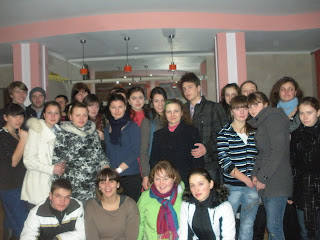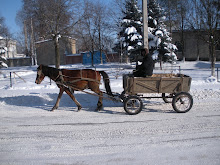 Their story: Natalia goes to the United States on a “work and travel” visa and meets Casey at a barbeque. His mother introduced them. It’s love. Casey and Natalia get married in a small ceremony in the States, but save the real celebration for Moldova. Weddings really are great here.
Their story: Natalia goes to the United States on a “work and travel” visa and meets Casey at a barbeque. His mother introduced them. It’s love. Casey and Natalia get married in a small ceremony in the States, but save the real celebration for Moldova. Weddings really are great here.As shown in the photos throughout this post, Natalia and Casey had their wedding in a very elegant, very modern Moldovan, wedding hall. This is the newest wedding hall in my town, and understandably the most popular. The photos also have great examples of Moldovan fashion, so look out for that too!
Having played the part of assistant to the maid-of-honor last summer, I was well prepared to go to this wedding and understand what was actually going on around me.
 For instance, as we walked up the massive pho-marble staircase to the wedding hall, under a four-tier chandelier, I heard an unmistakable crescendo .
For instance, as we walked up the massive pho-marble staircase to the wedding hall, under a four-tier chandelier, I heard an unmistakable crescendo .
"Ha! Guys," I said to the three other Peace Corps Volunteers in attendance, "that music is for us. We are entering to the trumpets." Erika wanted to turn around and go home immediately.
A few times I took a moment to chat up the groom's mother. Once, while dancing the hora, I asked her what she thought of the hora. "What's a hora, dear?" She asked. Helping other Americans understand Moldova's intricacies, especially when you know they already have an appreciation or investment in the culture, is a thrill. Maybe the youth council doesn't always consider me an expert on leadership trainings. But Americans visiting Moldova pretty much consider those of us who live here, work here, and speak one of the local languages to be just that.
Having played the part of assistant to the maid-of-honor last summer, I was well prepared to go to this wedding and understand what was actually going on around me.
 For instance, as we walked up the massive pho-marble staircase to the wedding hall, under a four-tier chandelier, I heard an unmistakable crescendo .
For instance, as we walked up the massive pho-marble staircase to the wedding hall, under a four-tier chandelier, I heard an unmistakable crescendo . "Ha! Guys," I said to the three other Peace Corps Volunteers in attendance, "that music is for us. We are entering to the trumpets." Erika wanted to turn around and go home immediately.
A few times I took a moment to chat up the groom's mother. Once, while dancing the hora, I asked her what she thought of the hora. "What's a hora, dear?" She asked. Helping other Americans understand Moldova's intricacies, especially when you know they already have an appreciation or investment in the culture, is a thrill. Maybe the youth council doesn't always consider me an expert on leadership trainings. But Americans visiting Moldova pretty much consider those of us who live here, work here, and speak one of the local languages to be just that.
This wedding also conveys one of the things I am most proud of about my service: my community integration. I knew the chances were pretty high that I would know a few other people at the wedding. Of course Maria Crigan was there, Ion Crigan too. I took a turn around the dance floor with the Mayor. Katia (who I worked with before she left last January to join her husband in Italia) and I hugged immediately upon seeing one another. I am so happy we got the chance to see each other again. An eleventh grade girl and I sang all the words to one of the Moldovan songs that just happens to be on my i-pod. My partner from the district council, a middle aged man, apparently likes to boogey. And then there was the woman from the post office. Because I have experienced this part many times before, it's a sure bet that next time I go to the post office she will say, "You are the girl from Natalia's wedding."
We stayed until the "undressing of the bride," the custom marking the bride's transformation into a homemaker. Her veil is replaced with a head scarf and she sits on the groom's lap while the older women shower them in all the fixings for a home (blankets, towels, cookware, etc). But given that Natalia and Casey already have a home in Alaska, most people just took the chance to put some money in Natalia's head scarf. Oh, and right before this I caught the bouquet!
Congratulations, Natalia and Casey!






































